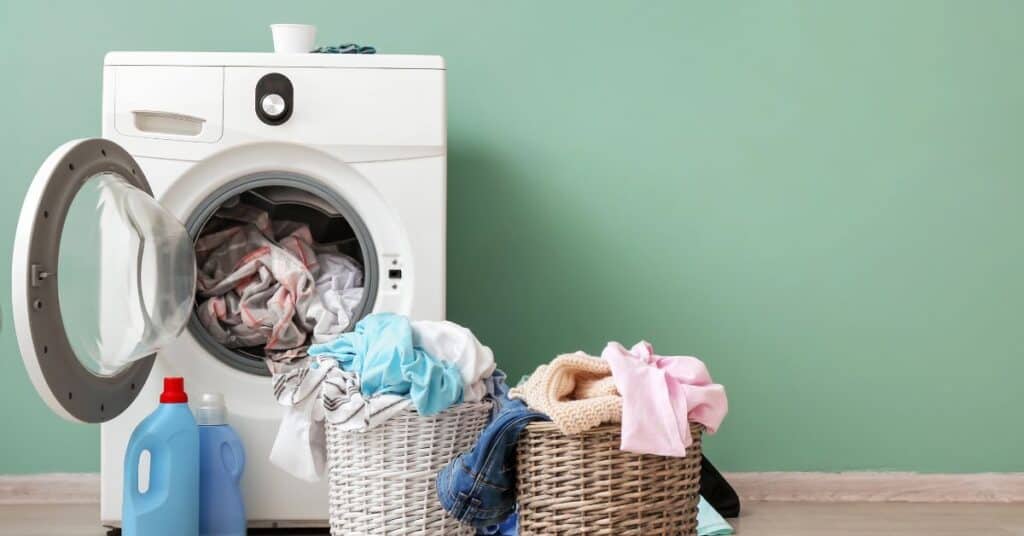Table of Contents
- Why Does It Matter How Much Soap or Detergent You Use?
- How Much Detergent Do You Need In a Washing Machine?
- How to Determine the Right Amount of Soap or Detergent for Your Washing Machine
- Liquid, Powder Detergent, Or Detergent Pods: Which Is Best?
- How Much Powder Detergent To Use In 7kg Washing Machine?
- Benefits Of Detergent Pods For Laundry?
- Does Soap Damage Washing Machine?
- How to Fix The Problems Caused by Using the Wrong Amount of Soap or Detergent for Your Washing Machine
- Conclusion
Would you like to know how much soap to use in the washing machine? The quantity varies depending on the type of laundry detergent.
First, the detergent used for laundry in a washing machine is called laundry detergent, not soap, because you can’t use soap in a washing machine except if you want to do your laundry by hand, then you can opt for soap, depending on your preference.
Several laundry detergents are available, including powder, liquid, and pods, each with its own concentration and recommended usage instructions.
You might ask why the amount of laundry detergent I use in the washing machine matters.
As an experienced soap maker who does laundry often, I understand the importance of using the appropriate amount of detergent for the washing machine.
Using too much damages your clothes. Instead, you want to stick to the right amount of detergent to ensure fresh-smelling laundry without wasting product or risking detergent buildup.
Emphasis on fresh-smelling and no detergent buildup because these are some of the reasons you wash your clothes in the first place.
In this article, I will explain how to figure out the optimal amount of soap or detergent for different types of washing machines and loads.
Let start!
Why Does It Matter How Much Soap or Detergent You Use?
Using the correct amount of soap or detergent for your laundry is essential for several reasons:
The right amount of soap or detergent in the washing machine ensures a fantastic cleaning performance and overall functioning.
There is a high chance of soap or detergent stains and odors on your clothes due to excessive detergent, thereby leading to washing the clothes for the second time, which is a total waste of time.
Plus, too much soap shortens the washing machine’s lifespan because Laundry detergents come in different concentration levels, ranging from regular to high-efficiency (HE) formulas.
Besides, the primary function of a washing machine is to clean, not necessarily to leave the detergent smell on the clothes after washing, and using deodorant to smell good is a great option.
How Much Detergent Do You Need In a Washing Machine?
We, as consumers, are so used to adding a full cap and dumping it in our washer. But in reality, your washer doesn’t need that much soap. How much soap to wash your car?
The detergent itself is already thick, so you want to use the right amount to avoid it sitting in the fabrics.
For an average-sized, soiled load with soft water, use 45 millimeters, and with the same size with hard water, use 150 milliliters or use 2 tablespoons of powder or liquid detergent and 1 for detergent pods for soft water and 4-5 spoons for hard water.
Hard water reduces the cleansing power of the detergent, necessitating more detergent use.
Additionally, some detergent brands come with measuring caps or scoops that specify the amount of detergent or soap to use on their pack.
And even if the detergent is without a cup or scoop due to environmental factors and the promotion of eco-friendly products, you can use spoons.
However, the above measurement might not work for every situation, considering factors like the washing machine type, fabric quality & water type, load size of your clothes, detergent type, and soil level.
So, in some cases, your load size may be higher than the specified amount on the detergent packaging; in that case, you probably should add more by dividing the specified amount on the detergent pack into 4 parts and pouring one part into the machine.
You just continue until you get the right amount for your size load.
One good thing about the specified amount on the detergent packaging is that it gives you a base to work with regarding the detergent measurement.
So, you are able to measure accurately without the mistake of overuse or underuse.
How to Determine the Right Amount of Soap or Detergent for Your Washing Machine
As I stated earlier, many factors must be considered when measuring the right amount for your wash load. Factors such as:
– What type of washing machine do you have? There are two main types: high-efficiency (HE) and standard.
If you have a high-efficiency (HE) washing machine, use detergents specifically formulated for HE machines and follow the manufacturer’s recommendations for dosing.
Today, many manufacturers produce high-efficiency washing machines. They use less water per load.
Detergent manufacturers have introduced HE (high-efficiency)detergent to match these appliances.
These soaps/detergents are formulated to quickly disperse cleaning agents without creating an abundance of suds.
They hold dirt in suspension so it is not returned to clean fabric.
HE detergents are designed to produce fewer suds and are more concentrated than regular detergents, so you’ll typically need to use less.
Use the standard measurement stated on the detergent or soap for standard machines.
– The size of the load you are washing. A typical load of laundry in the US is about 8 pounds. It’s essential to avoid overloading your washing machine with clothes.
Fill it with about 75 percent clothing and avoid packing clothes too tightly. Distribute clothes evenly and loosely inside to prevent damage to your machine.
Using too much or too little soap or detergent can affect the cleaning and rinsing of your clothes. Just ensure that whatever you use is the right measure.
– The soil level of your clothes. The dirtier your clothes, the more soap or detergent you need. The cleaner your clothes, the less soap or detergent you need.
You should always adjust the amount of soap or detergent according to the soil level.
Inaccurate measurement of soap or detergent can affect the removal and prevention of stains and odors.
– The water hardness in your area. The harder the water, the more soap or detergent you need. The softer the water, the less soap or detergent you will use, and vice-versa
Adjust the amount of soap or detergent according to the water hardness. Water type tends to affect the dissolving and rinsing of your soap or detergent.
Liquid, Powder Detergent, Or Detergent Pods: Which Is Best?
The modern consumer is presented with an array of detergent choices, each formulated to meet specific needs and preferences.
Among the most popular options are liquid detergent, powder detergent, and detergent pods.
These three contenders have distinct properties that cater to diverse washing routines, machine types, and cleaning demands.
Nevertheless, it is essential to know the properties, benefits, and drawbacks of each to help you make an informed decision about which one suits your laundry needs the best.
Liquid detergent: in its various formulations, liquid detergent is a versatile and widely used laundry solution.
It is known for its fluid consistency and ease of use. Liquid detergents are water-based solutions that incorporate a combination of surfactants, enzymes, and other cleaning agents.
Their liquid form allows for quick dissolution in water, ensuring even distribution of cleaning agents across the fabric.
Benefits of liquid detergent: One of the standout advantages of liquid detergents is their user-friendliness.
Their liquid form ensures easy pouring and quick dissolving in water. This makes them a preferred choice for those who value convenience and simplicity in their laundry routines.
A stain-free treatment: liquid detergents can double as stain pretreatments.
Their fluid consistency allows for targeted application to stains, allowing them to penetrate and break down the stubborn marks before the actual wash cycle.
Cold water efficiency: Liquid detergents are designed to dissolve effectively even in cold water, making them energy efficient and suitable for environments where hot water is scarce.
Drawbacks of liquid soaps: packaging waste: Most liquid detergents are packaged in plastic containers, contributing to the plastic waste problem.
Although some brands are trying to introduce eco-friendly packaging, the issue of plastic waste remains a concern.
How much liquid detergent to use in a 7kg washing machine top?
For a 7kg load in standard or high-efficiency washers, about 2 tablespoons of concentrated detergent should be ideal.
Remember to adjust the amount based on the soil level and water hardness to achieve clean and fresh clothes without causing unnecessary wear and tear.
How Much Powder Detergent To Use In 7kg Washing Machine?
The recommended amount of powder detergent for a 7kg washing machine typically ranges from 100 to 150 grams per wash cycle.
However, it’s important to check the specific dosing instructions provided by the detergent manufacturer, as the recommended dosage may vary depending on the detergent concentration.
Powder detergents have been a staple in laundry rooms for decades, offering a powerful cleaning punch in granulated form.
Powder detergents consist of dry granules that contain a blend of cleaning agents, enzymes, and surfactants.
They are often used in both top-loading and front-loading washing machines.
Benefits of powder detergent: cleaning power. Powder detergents are celebrated for their potent cleaning capabilities.
Their concentrated form allows them to contain a higher concentration of enzymes and other cleaning agents, making them exceptionally effective at tackling stubborn stains and high soiling costs.
Effectiveness in terms of cost per load. Powder detergents tend to be more economical than their liquid counterparts.
This makes them an attractive option for budget-conscious consumers or larger households with frequent laundry needs and less packaging waste.
Many powder detergents are packaged in cardboard boxes, which are generally more environmentally friendly and easily recyclable than plastic bottles.
Drawbacks of powder detergent:
Residue and clumping: Powder detergents sometimes leave residue on clothes or within the washing machine drum if not fully dissolved.
Additionally, they can clump together in humid conditions, reducing their effectiveness.
Cold water dissolving powder detergents might struggle to dissolve completely in cold water, necessitating warm water for optimal performance.
This could negate some of the energy-saving benefits associated with cold water washing.
Benefits Of Detergent Pods For Laundry?
Detergent pods represent a recent innovation in laundry care, offering pre-measured doses of detergent in a convenient encapsulated form.
Detergent pods are self-contained units that encompass a concentrated dose of liquid or powder detergent.
The pod’s outer material dissolves in water, releasing the detergent inside during the wash cycle.
Benefits of detergent pods: convenience; detergent pods epitomize convenience with pre-measured doses.
There’s no need for measuring or pouring, making them a hassle-free option for busy individuals or those seeking simplicity in their laundry routine.
Reduced wastage: The pre-measured nature of pods minimizes the risk of using excessive detergent, leading to wastage.
This not only saves money but also contributes to more environmentally friendly washing practices.
Portability pods are compact and easy to transport, making them an excellent choice for travelers. Or for doing laundry in shared spaces like laundromats.
Drawbacks of detergent pods
environmental impact: despite their convenience, the ecological implications of detergent pods can be a concern.
Most pods are packaged in plastic, contributing to plastic waste, and their compact design might make them less recyclable.
Cost per load: Detergent pods are often more expensive than traditional liquid or powder detergents.
While the convenience might justify the price for some, it’s an important consideration for budget-conscious consumers.
Limited customization: Pre-measured pods offer less flexibility in adjusting the detergent amount based on load size or soil level.
There is no definitive winner in the ongoing debate of liquid detergent, powder detergents, and detergent pods; the choice among these options depends on individual preferences, washing machine specifications, cleaning needs, and environmental concerns.
Does Soap Damage Washing Machine?
Soap typically doesn’t damage a washing machine, but improper usage and certain types of soap or detergent can cause issues over time.
Here’s how soap can potentially affect a washing machine:
Residue Buildup: Using too much soap or detergent or using products that aren’t compatible with your machine can lead to soap residue buildup.
This buildup accumulates in the machine’s drum, hoses, and other components, potentially causing clogs, odors, and reduced washing performance.
In addition, as detergent builds up, it leaves behind an invisible layer of film that traps dirt and hard water minerals, giving clothes a sticky feel and a dingy or faded appearance.
Foaming: Some detergents produce excessive suds or foam, especially in high-efficiency (HE) machines.
Too much foam overwhelms the machine’s pump and drainage system, leading to issues such as water leakage or drainage problems.
Corrosion: Certain types of soap or detergent, particularly those containing harsh chemicals, can potentially cause corrosion or damage to the machine’s metal components over time.
This is more common in older or poorly maintained machines.
Mechanical Issues: In extreme cases, excessive soap residue buildup or foaming strains the washing machine’s motor, bearings, and other mechanical parts, leading to premature wear and tear or mechanical failures.
How to Fix The Problems Caused by Using the Wrong Amount of Soap or Detergent for Your Washing Machine
Fixing the problems caused by using the wrong amount of soap or detergent for your washing machine requires several steps to address the issues effectively.
As regards mistakenly adding too much detergent to your clothes, run an additional rinse cycle without adding any detergent to help remove excess soap from the clothes and machine.
Also, after washing, rinse the washing machine with hot water and distilled white vinegar without adding any detergent. This process helps sanitize and deodorize your machine.
Soap Residue on Clothes: If clothes feel stiff, sticky, or less clean due to soap residue, consider rewashing them using a smaller detergent.
Alternatively, soak the affected garments in warm water to help dissolve the soap residue before rewashing.
Use a fabric softener during the rinse cycle to help condition the fabric and reduce the feeling of stiffness.
Consider contacting a professional appliance repair technician if the mechanical issues persist or you need help troubleshooting them yourself.
Additionally, it is essential to occasionally run a maintenance cycle on the washing machine with hot water and vinegar to help dissolve soap residue and remove any lingering suds or buildup.
Conclusion
Using the right amount of soap or detergent for your washing machine is good not only for your clothes and your machine but also for your wallet and the environment.
By understanding the factors influencing detergent usage and following the recommended guidelines, you can determine the right amount of soap or detergent for your washing machine.
Following the tips and tricks in this blog post can help you achieve cleaner, fresher, and longer-lasting laundry results.



